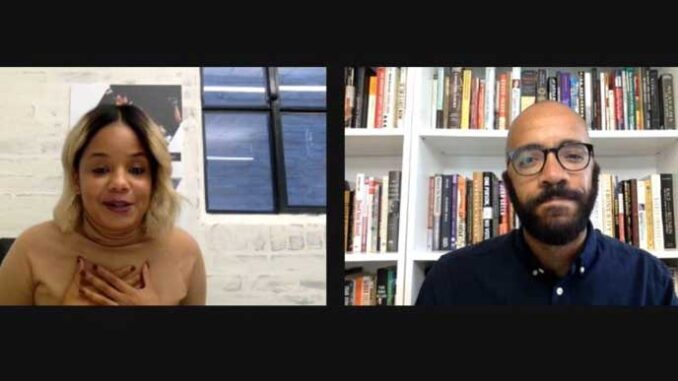
Nia Brown Data News Weekly Contributor
A new New Orleans will require investment. Those were the insights of artists, creatives, and entrepreneurs as they brainstormed ways to jumpstart an equitable recovery for New Orleans, at the 2021 Guardian Summit, held virtually on Oct. 12th, and hosted by New Orleans-based Camelback Ventures.
This year’s summit featured Artist Brandan “BMike” Odums, and special guest Olympian Allyson Felix, an entrepreneur and activist who launched her own athletic line.
Camelback’s mission is to increase access to opportunities for entrepreneurs of color and women by investing in their ventures and learnership while advocating for fairness in their funding, said Kelli Saulny, the Director of Strategic Partnerships, who moderated a discussion titled “The Makings of A Futuristic Recovery” at the summit.
“The goal of this panel and the summit is to drive meaningful discussions to use our creativity and insights to create a more balanced and equitable future with the ability to think and innovate more freely,” Saulny said. She noted the many New Orleans natives who have seen the impact that recovery has had on reshaping communities, narratives, and the City of New Orleans.
Among those natives is author and poet, Clint Smith, now a staff writer at The Atlantic, whose latest book “How the Word is Passed: A Reckoning with the History of Slavery Across America,” is a #1 New York Times Bestseller that made the longlist in nonfiction for the 2021 National Book Award. His poetry collection “Counting Descent,” won the 2017 Literary Award for Best Poetry Book by the American Library Association.
Smith reflected on what it was like to grow up in the City of New Orleans before and after Katrina. He has seen what “recovery” looks like for different people after Katrina and the impact it has had on the Black community, who were unable to return to life as they knew it to be in the city. He spoke on those who have benefited from the disaster and how it has changed the city itself.
“Part of what we think of when we think of recovery, is like, who is being afforded the opportunity to come back and how is that going to subsequently animate both the culture, the sort of social demographics and the landscape of what that place looks like and we see it happen in all sorts of neighborhoods around New Orleans that look very different from when they did 15 years ago,” Smith said.
The recovery of the city has been frustrated by continued natural disasters and now the Pandemic, the panelists said. Even if the crisis is different, recovery still would not look fairly the same for everyone.
The cycle has been going on for a very long time, Smith explained. The narrative that history has taught Americans is that there will also be two sides of recovery due to racial disparities. As long as there are racial disparities within the crisis there will always be racial disparity in the recovery, he added. Investment plays a major role in helping all people equally recover, the panelists said.
“If you really want to recover, the recovery is in the people,” Saulny said, “not just the infrastructure.
“If we continue to position certain people or marginalize certain people, we’ll keep repeating history no matter what the disruption is, no matter what the crisis is the same people will continue to be impacted,” Saulny added.
Local entrepreneurs are close to communities to understand their problems and to help find solutions, the panelists said. The role of Black entrepreneurs can help in a futuristic recovery, by joining forces to collaborate with communities to create new innovations in those spaces.
“When we think of entrepreneurial interventions, when we think about what it means to go into these communities, I think part of what we have to do is not suggesting to individuals or to communities that somehow they are responsible for the conditions that they find themselves in,” Smith said.
“Instead, we are here to be partners in an attempt to create the sort of community that they want to live in, be a part of and stakeholders, rather than having these decisions proposed on them without their input or from afar,” Smith said.
New York Times #1 best selling author, New Orleans native Clint Smith spoke at the 2021 Guardian Summit held virtually on Oct. 12th.
New Orleans equity start-up firm Camelback Ventures hosted the summit. Kelly Saulny, the Director of Strategic Partnerships for Camelback Ventures moderated a discussion on the future of recovery with author and poet Clint Smith.
Recommended For You.



Be the first to comment